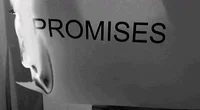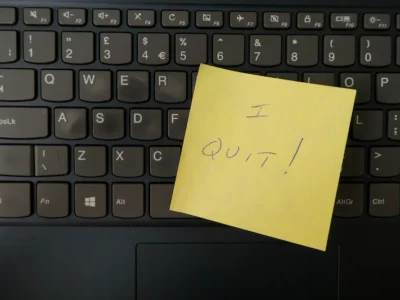I know what you’re thinking: you are tired of the long hours, exhausting work, overbearing customers or passive management. You want to call it quits as quickly as possible. Be careful and don’t cut all your loose ends, though. Handing a resignation letter with an “imma head out” SpongeBob meme or leaving without a word might seem funny or easy, but a formal resignation is usually the correct route when quitting a job. Don’t throw caution to the wind and give everyone a piece of your mind. Being professional and mature is crucial, no matter how much you want to tell someone where they can shove it.
If you don’t know where to start, here are some suggestions on what not to include in your resignation letter.
1. Don’t tell your boss to shove it.

As hard as this may be, this is the person who decided to hire you, gave you a chance and might even determine if you get hired by your next employer. Cursing them out and telling them how horrible they are is probably not the best idea. A huge part of working is the experiences and references you gain along the way. Don’t let those petty feelings get in the way of future opportunities.
“Be professional. This is an important document that is written and saved. Employers can come back to look at this from your previous jobs. Anything you shouldn’t say at work should not be in a resignation letter. Your future employee can call, and they can ask questions about things like this. The company will keep your letter and other companies can ask for it. When they ask about you for hiring and see this letter, they’ll know the answer,” Starbucks Store manager Katie Sbrocco said.
I’m not saying this just because Katie is my boss, but she is right and insightful when it comes to resignation letters. This is not because she has written them before, but because she has seen many of them. The boss is the person who will see, save and send your letter where it needs to go. They are the person who will open your door or close it when it comes to your future. Listen to Katie and save your future.
2. Don’t burn bridges.

Just like you shouldn’t give your boss a piece of your mind, your co-workers could be just as important on your career journey. You should always be respectful to the people you work with, even if you are leaving. That means steering clear of not showing up to shifts without notice, being rude or inconsiderate to others just because you’re leaving or quitting without notice. Thinking about your future and not the past is a great mindset to have. A good relationship with coworkers could get you favors in times of need, references for future jobs or a chance to work with them again. Who knows— maybe an old coworker will be your future boss down the line.
3. Don’t say how much you hated your job

You could drone on and on about how much you loathe every aspect of your job in your letter, but why give them that satisfaction? Feel free to talk about these aspects through word of mouth, but definitely not to your boss and not in writing. What if something bad happens and your job falls through, or you end up hating it more and need to come back to your previous company? Do you think they’ll accept you back after trash-talking your boss? There are so many variables to think about. It’s better to just let it go and move on because they sure will. Ensure your safety net. It will benefit your career and your mindset. Holding grudges is unhealthy and you should focus on moving forward in life. Just say you were grateful for the opportunity and call it a day.
4. Don’t use profanity or slang.

Just as you wouldn’t curse (or at least shouldn’t) on the job or curse on anything another professional document, you should not curse on a resignation letter. It is called a professional document for a reason. Even if you joked around or had that rare, good relationship with your supervisor, you still should remain professional in the letter. You never know who might look at that thing. You want to express how mature you are about this situation and get that same respect back. So, leave out generational language like emojis, slang and perhaps even conjunctions to represent the ultimate professionalism.
5. Don’t give too much detail.

You want this letter to be short and simple. Less is more, as the saying goes. You don’t need to go into detail about how your new job is way better or even where you will be working. They don’t need to know that. Keep it to the imagination and let them think whatever they need to. If you end up doing way better without them, good for you, but like I said, they don’t need to know that. A great way to know what to put in a resignation letter is to review resignation letter samples.
“I would refrain form putting any specific reason why you’re resigning. You need to leave that up exit interview. Saying just “My notice will be effective this day,” no reason for it, or “to whom it may concern.” You could still thank them for their time, still keep it positive even if you didn’t have a positive experience with the company,” Starbucks assistant manager Nikki Lehman said.
See, even the A.M. (assistant manager) doesn’t want to hear about what you’re doing or where you’re going. Not that they don’t care about you, but it is not something relevant for a resignation letter. You don’t have to give an explanation like you’re guilty or you need to justify your reason for leaving. I know you’re anxious, but you don’t owe them anything more. Just the right amount of professionalism will do you just fine.
6. Don’t threaten anyone.

To threaten someone is more than just saying you would hurt them (although don’t say that either). Saying things like you would ruin their business, tell everyone to not work here or that they’ll regret everything they did to you. If they were really that bad then you should take that up with a higher power like corporate, just don’t tell them that in your letter. The best revenge is just living your life without them on your mind or your nerves.
“I wouldn’t say anything about demeaning the company. What you say on paper matters, and I wouldn’t be negative towards them even if you’re leaving,” Starbucks supervisor Jon Gordillo said.
I feel lucky that Jon and I have a great relationship, but even if we didn’t, it’s not nice or professional to threaten him with getting him fired or making sure he never works here again. What if Jon gets a job as my boss one day? What if I need his connections to help me get a job? Whether you like someone or not, just be mature and keep any trash talk out of your letter.
7. Don’t be over-sentimental.

There’s no need to be poetic when saying goodbye. Whether or not you had some good times, just saying you’re grateful for the opportunity is more than enough. If you would like to genuinely express your appreciation, talking about it in person is a better idea than putting it in your resignation letter. Only the most important things should be expressed, like that you are stepping away from the company either for good or temporarily when your last day will be, and what your availability will look like in the meantime.
8. Don’t send it in without double-checking.

Always, always, always proofread your documents before sending them in. Of course, that goes for everything, but you don’t want there to be any miscommunications when resigning. It is important to recheck your spelling and grammar (to not look like a fool) and avoid misspelled words that might confuse your boss. You want this letter to be very easy to read for others to clearly understand what you are expressing. Not proofreading can end up making your letter look unprofessional and perhaps a little funny.
9. Don’t make promises.

After you leave, you leave. You don’t owe the company anything, you don’t need to make promises or any more commitments like when you were their employee. The point is you’re not theirs anymore. So don’t say you could still be available for them or that maybe you’ll come back and help when they need it. Your goal is to quit and let them know it, respectfully. Don’t feel obligated to keep ties. The occasional “where’s my W-2” call is okay, but for this letter, pay your dues and get out.
10. Don’t pile on too many issues.

Now, there was a time I wanted to do this, not just for my own benefit, but for other employees’ benefits. To give constructive criticism the higher-ups need to hear to make the job less terrible for their employees. But I found out it is better to discuss that in person if you really need to. Having those one-on-one conversations about these concerns is fine, just not on your resignation letter. So don’t start a list about how the method is bad or how this employee is terrible or how their work ethic doesn’t make any sense. If you need to say your peace, say it, don’t write it, or just move on and let someone else deal with the problems that are no longer your concern.



















